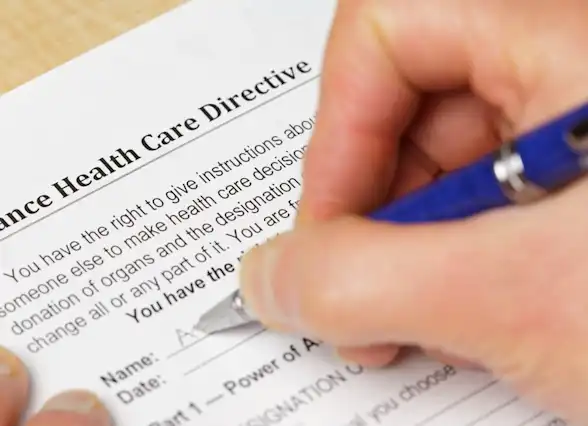An Advance Directive By Any Other Name...
An advance directive, also known by many other names, is a legal document that ensures your loved one's medical preferences are known and honored.
Get insurance benefits, legal documents, and medical records in one place

Helpful Highlights
An advance directive is known by many names and covers many situations.
An advance directive can stand alone, or it can be attached to a medical (or healthcare) power of attorney (POA).
An advance directive is essential for future care planning.
An advance directive can be self-completed (does not require a lawyer).
Also known as...
Advance directives are also known by the following names:
Living will
Healthcare directive
Healthcare proxy
Medical directive
Medical surrogate
Directive to physicians
Declaration regarding life-sustaining procedures
Order for life-sustaining treatment
And might be included in the following documents:
Patient advocate designation
Durable power of attorney (POA) for healthcare
Medical power of attorney (POA)
Healthcare power of attorney (POA)
Even a do not resuscitate (DNR) order is a form of advance directive.
What is it, exactly?
An advance directive is a legal document that allows individuals to specify their preferences for medical treatment, especially in situations where they may be unable to communicate or make decisions. It typically includes instructions about life-sustaining treatments, resuscitation, and organ donation. Advance directives provide guidance to healthcare providers and loved ones, ensuring that the individual's wishes for medical care are honored.
What does it include?
An advance directive typically includes instructions and preferences for these treatment situations:
Life-Sustaining Measures: Interventions such as cardiopulmonary resuscitation (CPR), mechanical ventilation, and artificial nutrition and hydration.
Medical Procedures: Specific medical treatments or procedures, such as surgery, blood transfusions, and diagnostic tests.
Palliative Care: Symptom management (such as pain and anxiety), along with comfort care during serious illness or at the end of life.
Nursing Home or Hospice Care: Preferences for care settings and specific instructions for care in these environments.
End-of-Life Care: Instructions for the type of care and environment preferred as the end-of-life approaches, perhaps even the disposition of the body following death.
Organ and Tissue Donation: Wishes regarding the donation of organs or tissues for transplantation or medical research.
It's important to note that even more details and specific content can be included in an advance directive based on individual preferences, cultural considerations, and jurisdictional legal requirements.
Why is it important?
It allows your loved one to document their specific healthcare preferences and treatment choices, ensuring that medical decisions align with their values.
It empowers your loved one to maintain control over their healthcare, especially in situations where they may be unable to communicate or make decisions.
Your loved one can communicate their desires for the quality of life they wish to maintain, particularly in situations involving serious illness or end-of-life care.
It allows your loved one to express their intentions regarding organ and tissue donation, sparing family members from potential discomfort and dismissing any conflicting ideologies.
It prevents family fighting and avoids healthcare provider ethical dilemmas.
Having clear, pre-determined directives relieves family members and loved ones from the burden of making difficult decisions during emotionally challenging times.
It helps prevent unwanted or ineffective medical interventions by specifying the circumstances under which certain treatments should or should not be administered.
A properly executed advance directive is a legally binding document that healthcare providers must follow, providing a formal means of ensuring that one's wishes are honored.
In many jurisdictions, an advance directive is essential for ensuring that one's wishes are respected, as healthcare providers often require legal documentation to follow specified instructions.
Knowing that your loved one's preferences are documented and legally recognized can bring peace of mind, reducing anxiety about future medical decisions.
It encourages open communication about healthcare preferences among family members and healthcare providers, especially at end-of-life.
In summary, an advance directive is a crucial aspect of future care planning, providing your loved one with the opportunity to shape their healthcare journey and have their preferences honored in times of incapacity or serious illness.
How is an advance directive created?
While it is advisable to work with legal professionals to ensure that the advance directive accurately reflects an individual's wishes and complies with applicable laws, it is not necessary. All 50 states and all U.S. territories have advance directive forms available directly to your loved one that, when completed properly, are just as legally binding as any drafted by a lawyer.
No one has to wait until they are elderly or have a serious illness to execute an advance directive!
No content in this app, regardless of date, should ever be used as a substitute for any direct legal advice you receive from your lawyer or other qualified legal professionals.
Get more support and guidance on insurance benefits, medical records and legal forms.
Helpful brings together your insurance benefits, legal documents, and medical records in one personalized place — so you always know what you have, and never have to search again.

Technology for Health Tasks. Mental Health for the Tough Stuff.
Helpful connects your medical records, insurance, and caregiving tasks automatically. And when you need more than logistics, a therapist is here to guide you.
In-Network and Covered
For Individuals, Couples and Families
HIPAA Compliant, Data Stays Private


Healthcare Tasks Simplified

From syncing records to spotting drug interactions, Helpful does the heavy lifting, turning complex health info into clear tasks and showing you benefits you can actually use, giving you clarity and control over your care.

In-Network Mental Health

Our licensed therapists are here to support you and your loved ones through stress, burnout, and life’s hardest moments, with an inclusive, compassionate approach that works with most insurance plans.

Create Legal Documents

Plan ahead by creating will, trusts, advance directives and more, that ensure your wishes are honored in the event you can’t speak for yourself -with Helpful guiding you every step of the way.